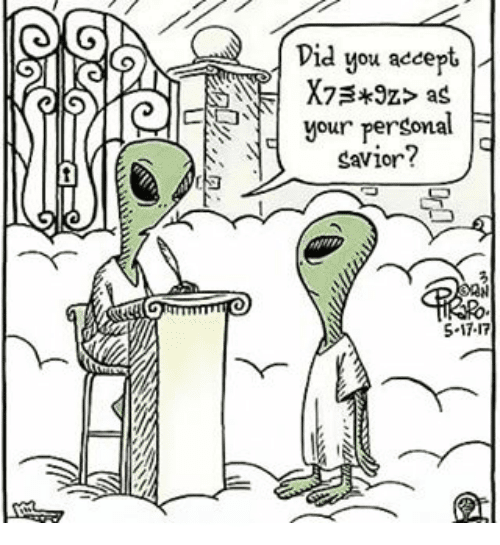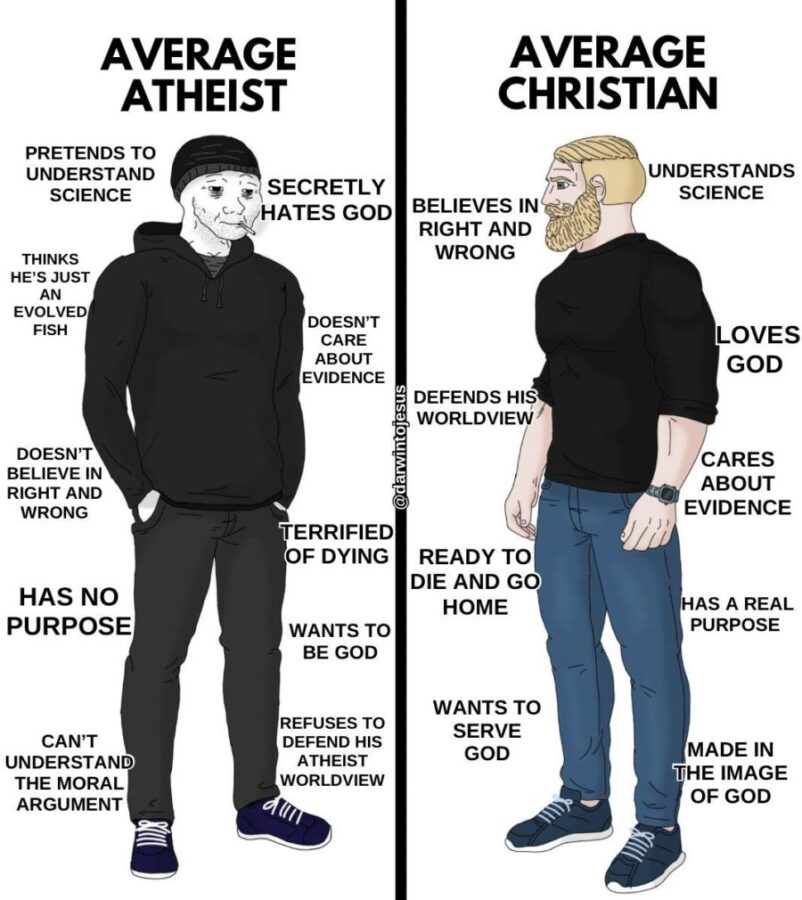
Part One — Part Two — Part Three — Part Four — Part Five
“Dr.” Arv Edgeworth recently sent me the following comment:
Hi Bruce,
I am interested. Would you be willing to share with me why you left Christianity, and now consider yourself an atheist? I promise not to be judgmental. I honestly would like to see things from your perspective. My wife and I live in Southwest Ohio, and next week will be celebrating our 60th anniversary. I wish you well.
Sincerely,
Dr. Arv Edgeworth
In 2011, Edgeworth described himself thusly:
I am an evangelist. In the last 14 years I have spoken in over 300 independent, fundamental Baptist churches in 25 different states. I have spent a great deal of time discussing doctrinal issues with those pastors. I have also discussed standards of dress and conduct with them. I send out a newsletter to about 2100 independent, fundamental, Baptist churches nation-wide.
Edgeworth operates the Truth and Science website — a site devoted to young earth creationism and debunking evolution.
Many years ago, Dr. Arv Edgeworth was asked to head up a Six-Step Problem Solving team for the General Motors Corporation. As part of his training he was taught in the proper use of the Scientific Method. His team had a 100% success rate. His love of science grew. He then began collecting science textbooks, collecting over 150 of them. He also collected, about 80 other books about science. He began to be very burdened over the Creation vs Evolution issue. In January of 1997, God called him into Creation Evangelism.
Dr. Edgeworth has given over 450 seminars on the Creation vs Evolution issue in churches and schools in 27 different states. He now sends newsletters to thousands of scientists, science teachers, pastors, churches, and many others.
As most independent Fundamentalist Baptist preachers sporting doctorates, Edgeworth’s degree is honorary, as he states himself in a comment on the following site. (Please IFB Doctorates: Doctor, Doctor, Doctor, Everyone’s a Doctor.)
In his first email to me, Edgeworth asks me why I left Christianity and why I consider myself an atheist. I find such questions annoying. Even a superficial perusal of this site would direct a person to the page WHY? On this page are numerous articles answering Edgeworth’s questions. Alas, many Evangelicals lack curiosity, as I make clear in a post titled Curiosity, A Missing Evangelical Trait.
Edgeworth promised not to be judgmental if I responded to his email, but as you will see below, he failed to keep his word.
I did not respond to Edgeworth; my editor, Carolyn, did. Carolyn has been my editor for years. When I am not feeling well — and currently in a tough spot physically — Carolyn will answer some of my emails, especially those that can be answered without theological or philosophical responses. Edgeworth asked a question, to which Carolyn, my Internet wife, replied:
Mr. Edgeworth,
I am Bruce’s editor and sometimes-answerer of his emails. Please read all the links on the Why page on Bruce’s blog, The Life and Times of Bruce Gerencser, and you will have an understanding of why and how he left Christianity. The short answer is that after he retired, he began to examine all of the tenets of Christianity and how they didn’t fit together and how they contradicted one another, and he reached the point where he no longer believes in the basics of Christianity — the virgin birth, the miracles Jesus supposedly performed, his alleged resurrection, heaven, hell, angels, satan, etc. The more he examined, the more he realized he didn’t believe. He cannot worship a god who would have a hell and a lake of fire where a god tortures certain people for eternity after our relatively short stay on earth.
Carolyn Patrick, editor for Bruce Gerencser
Excellent response. Short and to the point, directing Edgeworth to where he could find fuller explanations for why I converted.
Of course, Edgeworth couldn’t be bothered to do his homework — yet he wants everyone on this site to read his website. He shows no awareness of my background or that I was a college-trained IFB/Evangelical pastor for twenty-five years. There’s nothing in my story that remotely suggests I was a liberal Christian; that I had head knowledge, but had never been born again. Both of these claims are patently false.
The “non-judgmental” Edgeworth is, in fact, judgmental, consigning me to Hell because I don’t believe as he does. He predicts (and knows for sure) that I am headed for Hell and assumes the same about Carolyn.
Here’s what he said:
Hi Carolyn,
Thank you for your reply concerning why Bruce left “Christianity” and became an atheist. The things you told me about Bruce seem to indicate clearly that Bruce may have had a head knowledge about God, and considered himself to be a “Christian,” but has never experienced the new birth. That often happens if someone is in a liberal denomination that does not preach and teach the true gospel. They are “Christians” in name only.
I can predict one thing for sure. Bruce will believe in God, and heaven and hell in the future: one moment after he dies. It is a terrible thing for Bruce that he never experienced true Christianity. How about you Carolyn? Would you like to be 100% sure about your eternity? You can be. You owe it to yourself and to Bruce to at least check it out. I hope you and Bruce have a great eternity. Eternity is a long time to be wrong! Please check this out for yourself. You will be eternally grateful that you did!
https://www.truthandscience.net/exploring-eternity
Sincerely,
Dr. Arv Edgeworth
Born-again Christian
Carolyn replied:
Mr. Edgeworth,
Are you telling me that you relied only on my writing to make the decision that Bruce had “head knowledge” but didn’t experience a “new birth”? Are you telling me that you didn’t read the links on the Why page of Bruce’s blog? If so, SHAME ON YOU! Don’t take my word for it, read Bruce’s own words, his own writing. I am fully convinced that Bruce was born again when he was 15 and had a personal relationship with Jesus for more than 25 years. Bruce was not in a liberal denomination but was the pastor of several Independent Fundamentalist Baptist (IFB) churches. He preached and taught the true gospel. He would have been a Trump supporter in his Christian days.
I am an agnostic atheist. I have no belief in any god or gods – not yours, not the Catholic god, not the Pentecostal god, not the Episcopalian god, not the Baptist god, not the Methodist god, not the Mormon god . . . . Need I go on? I have no belief in any god. If scientifically valid evidence were presented to me by a god, I might (or might not) believe in her, but as things stand now, I have seen no evidence for the existence of any god, and I therefore have no belief in any god. I am 100% sure about my eternity, and yours too. Yours will be the same as mine and Bruce’s.
Carolyn Patrick, editor for Bruce Gerencser
Edgeworth replied (relevant parts quoted):
Hi Carolyn,
I have finished reading most of the “Why” section on Bruce’s blog. I did skim through a few things, just focusing on the most important. I then compared them with the things you said about yourself. I hope you won’t mind if I try to put a few things into perspective.
…
Your Beliefs and Bruce’s
Bruce refers to himself as an atheist. You refer to yourself as an agnostic atheist. All of this is based on what you choose to believe. The same can be said for the evolutionist. What I don’t see in any of this is a sincere desire to know the TRUTH. Where does REALITY fit into any of this? What about the REALITY of what actually happened in the past, is happening now, or will happen in the future? Does that matter to you?
I have a PASSION for TRUTH! Judging from what you have said: It doesn’t appear that either you or Bruce have any desire to actually KNOW what the TRUTH is. The word “science” means “to know.” It doesn’t mean “to believe.” You and Bruce have every right to choose to believe what you want to. But what about the TRUTH about what actually IS?
The existence of God is based in the REALITY of what actually is. What anyone chooses to believe or not believe has no bearing on the REALITY of what actually is. That is why the Supreme Court ruled that Atheism is a religion. At least they got that one right. Just my personal belief.
For example: You say that my eternity will be the same as both yours and Bruce’s. That isn’t something that you know or can be known is it? You may choose to BELIEVE that, but it will have no effect on the REALITY of what actually IS.
Evolution Can Be Easily Disproven!
I could give you the scientific evidence to prove that. The real facts though seldom result in people changing their mind about what they have chosen to believe. God exists, but He will only prove that to you if you are honestly seeking the TRUTH.
We all fit into one of two categories:
(1) An honest seeker of TRUTH.
(2) A protector of a BELIEF SYSTEM.
What you choose to believe, has no effect on the REALITY of what actually IS. I wish nothing but the best for both of you. The TRUTH really will set you free.
In Search of the TRUTH,
Dr. Arv Edgeworth
Several hours later, Edgeworth wrote:
Hi Carolyn,
I was curious how you could feel so confident Bruce at one time was a born-again Christian unless you had perhaps experienced the same thing yourself. Do you have a story to tell?
Using Bruce’s logic though, if I were to observe a smashed Chevrolet, I would contact General Motors and tell them I could no longer believe in them as a great company because they build automobiles that people can smash. In fact, I am beginning to believe that they no longer exist, or perhaps never did. Same logic?
Also, for a fundamental Baptist preacher to pastor several churches while at the same time, having a mistress on the side, and the probable guilt and shame that he carried with him, but claim that had nothing to do with where he is at today, might lead someone to think he is delusional, at least to himself. But I do not judge him for that, we all fail at times.
By the way, do you know why God gave us the 10 Commandments? To prove to us that we couldn’t keep them, and needed a Savior to die in our place.
But having said all I have, I can guarantee, based on the infallible Word of God, that God still loves both of you, and desires nothing but the very best for your lives. That will never change, because God never changes. He may choose to operate differently at times, but He is unchangeable. He is a God you can trust, no matter how certain experiences may lead you to believe otherwise.
God could have built a bunch of robots that would always do right, but in accordance with His love, justice, mercy, and wisdom, He choose to form the Earth to be inhabited by fallible humans such as you and I.
As the loving father welcomed the prodigal son with open arms, God will do the same for you.
In Christian Love,
Certainty — a foundational belief for IFB Christians — breeds arrogance, and Edgeworth is certainly that. Without getting into a long debate, let me answer several of Edgeworth’s claims.
About my “chosen” beliefs. It is debated whether any of us chooses to believe. For the sake of argument, I will accept Edgeworth’s claim that I chose to be an atheist. I chose to be an atheist based on my careful, painful re-examination of the central claims of Christianity. This was me seeking TRUTH. Edgeworth seems unaware that I am a college-trained pastor, spent twenty-five years in the ministry, preached over 4,000 sermons, and spent over 20,000 hours reading and studying the Bible. It is disingenuous for Edgeworth to claim that I was not a sincere seeker of truth. You are fucking kidding me, right? I have spent more time and effort in understanding the teachings of the Bible than most Christians, including preachers. What, exactly, does Edgeworth think I “missed?” He has no evidence for his claims about my life. He asked for no clarifications and made little to no effort to understand my story. To Edgeworth, I say, the triune God of the Bible said: Answering before listening is both stupid and rude. (Proverbs 18:13) Do better, Edgeworth, do better. I am not your typical atheist. I am not ignorant about Christian theology or church history. I am conversant in all things Christian.
I am baffled as to why Edgeworth brings up evolution. What I believe about the beginning of the universe and how best to explain the natural world has nothing to do with atheism. Atheism is a singular claim about the lack of existence of deities. That’s it. I know several Christians who accept evolution as a scientific fact. Thus, one can believe the core doctrines of Christianity and evolution at the same time. To suggest otherwise means that salvation is by “right belief” and not faith.
I am a sincere seeker of truth. Edgeworth can’t accept this fact, of course, because it doesn’t comport with his peculiar claims. That my proverbial peg doesn’t fit in his hole is his problem, not mine. If Edgeworth wants to challenge my beliefs, I’m game. I am, however, not interested in discussions with people who do not respect me enough to accept my story at face value. Edgeworth says he’s a Christian. As a man who respects others, I accept his story at face value. It would be nice if Edgeworth would do the same. I know, I know, Edgeworth is an IFB preacher. Scores of Edgeworths have emailed me and commented on this site. I have generally found IFB preachers to be “Assholes for Jesus.”
In his last email, Edgeworth questioned whether I was a real Christian since I admitted to having an affair! This ludicrous and false statement suggests that Edgeworth did not carefully read the posts on the WHY? page. Had he done so, he would have learned that the post It’s Time to Tell the Truth: I Had an Affair is satirical.
Edgeworth mentions the Ten Commandments and the infallibility of the Bible, as well as arrogantly saying, based on evidence he does not have, nor can he possibly have, “I can guarantee, based on the infallible Word of God, that God still loves both of you, and desires nothing but the very best for your lives.”
How could Edgeworth possibly know that God still loves me and desires nothing but the best for my life? Does he know the mind of God? How does he know I’m not a reprobate or an apostate? I can definitively prove that I am both — gladly so. And as far as the Protestant Bible being (inerrant) and infallible, give me a break. That claim carries no weight and can easily be disproven. Edgeworth is King James Only. I assume he believes the KJV is infallible too, and not just the original manuscripts — which are not extant.
To Edgeworth, I say, if you want to talk about the law of God or the inerrancy/infallibility of the Bible, I’m game. As far as evolution is concerned, I am not a scientist. I have no relevant expertise regarding evolution. Others on this site do, some of whom are trained scientists, so if they want to engage you on matters of science, I am sure they will respond.
Wade in if you dare, Arv, but please know that this site is not a den of “ignorant” atheists or people who, as your friend said, “reject the authority of God in their lives.” For me personally, I think you will find that I can adequately and competently discuss Christian theology with you — especially in its Evangelical and IFB varieties.
Saved by Reason,

Bruce Gerencser, 68, lives in rural Northwest Ohio with his wife of 47 years. He and his wife have six grown children and sixteen grandchildren. Bruce pastored Evangelical churches for twenty-five years in Ohio, Texas, and Michigan. Bruce left the ministry in 2005, and in 2008 he left Christianity. Bruce is now a humanist and an atheist.
Your comments are welcome and appreciated. All first-time comments are moderated. Please read the commenting rules before commenting.
You can email Bruce via the Contact Form.





